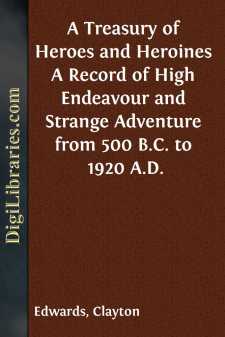Categories
- Antiques & Collectibles 13
- Architecture 36
- Art 48
- Bibles 22
- Biography & Autobiography 813
- Body, Mind & Spirit 142
- Business & Economics 28
- Children's Books 17
- Children's Fiction 14
- Computers 4
- Cooking 94
- Crafts & Hobbies 4
- Drama 346
- Education 46
- Family & Relationships 57
- Fiction 11829
- Games 19
- Gardening 17
- Health & Fitness 34
- History 1377
- House & Home 1
- Humor 147
- Juvenile Fiction 1873
- Juvenile Nonfiction 202
- Language Arts & Disciplines 88
- Law 16
- Literary Collections 686
- Literary Criticism 179
- Mathematics 13
- Medical 41
- Music 40
- Nature 179
- Non-Classifiable 1768
- Performing Arts 7
- Periodicals 1453
- Philosophy 64
- Photography 2
- Poetry 896
- Political Science 203
- Psychology 42
- Reference 154
- Religion 513
- Science 126
- Self-Help 84
- Social Science 81
- Sports & Recreation 34
- Study Aids 3
- Technology & Engineering 59
- Transportation 23
- Travel 463
- True Crime 29
A Treasury of Heroes and Heroines A Record of High Endeavour and Strange Adventure from 500 B.C. to 1920 A.D.
by: Clayton Edwards
Categories:
Description:
Excerpt
BUDDHA
About five hundred years before the birth of Christ a mighty king reigned in India over the land of the Sakyas, from which the snowy tops of the Himalaya Mountains could be seen. His name was Suddhodana and he had two wives called Maya and Pajapati; but for a long time they bore him no children, and the King despaired of having an heir to his throne. Then Queen Maya bore a son and after he was born, the legends tell us, she had a dream in which she saw a great multitude of people bowing to her in worship. Wise men were summoned to interpret the dream, and they told her that the King's son, so golden in color and so well formed, was destined for greatness as surely as rivers ran to the sea—that he would become either a mighty conqueror who would subdue all the people of the earth, or a holy saint, a "Buddha" (the word for one enlightened) who would have more power over the minds of men than the mightiest conqueror could gain over their bodies.
All this was confirmed in the minds of the wise men on account of the wonderful portents that took place at the birth of the child: flowers bloomed in barren places and springs gushed from dry rock on the day when the Prince was born. He was named by the King, "Siddartha,"—a word meaning one who always succeeds in what he undertakes—and because of the portents at his birth the King himself bowed down to his own son and did him homage.
Now the King desired greatly that the first of the two prophecies should come to pass. He wished the Prince to be a conqueror, not a Buddha, and extend the power of the Sakyas by the sword through every part of the world. And he did everything in his power to bring this end about and to weaken the possibility that his son should ever be a holy man.
When the child was still very young a further prophecy was made to the King—namely that the Prince would only become a Buddha after he had seen four common sights which for him would be four omens—an old man, a sick man, a dead man and a holy man in the yellow robe of a beggar. Then and then only, said the prophecy, the Prince would leave his country; furthermore, if he remained at home for a certain length of time he would never leave at all, but would turn all his attention to the art of war, and his armies would sweep over the face of the earth like a devouring flame.
The King summoned his counsellors. He commanded them to make sure that no sick men or old men, no funeral escorts or beggars should ever be allowed on the streets of the city when the Prince was passing. All ugly sights were to be kept from him; he was to be surrounded with such pleasures and such beauties that he would never desire to leave his home; he was to know nothing of the meaning of death; poverty was to be hidden; suffering and sorrow of all sorts were to be concealed in his presence. In these ways, thought the King, any desire to be a priest would be stifled in the Prince, and he would at last become a mighty conqueror as the prophecy had foretold....


